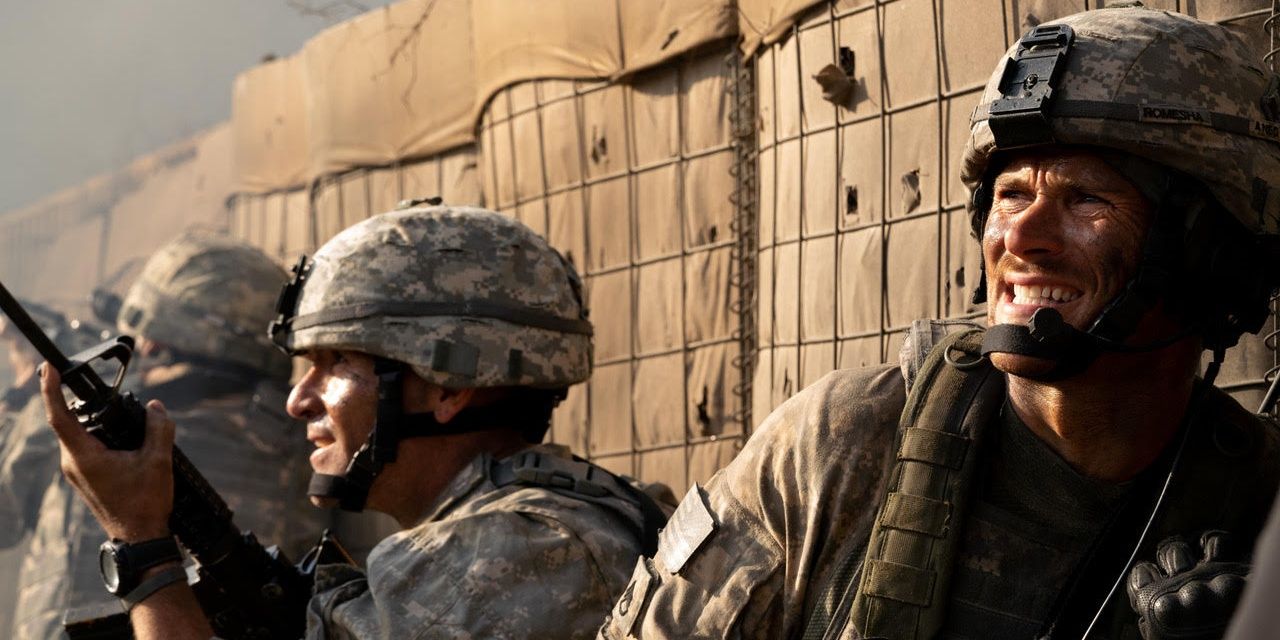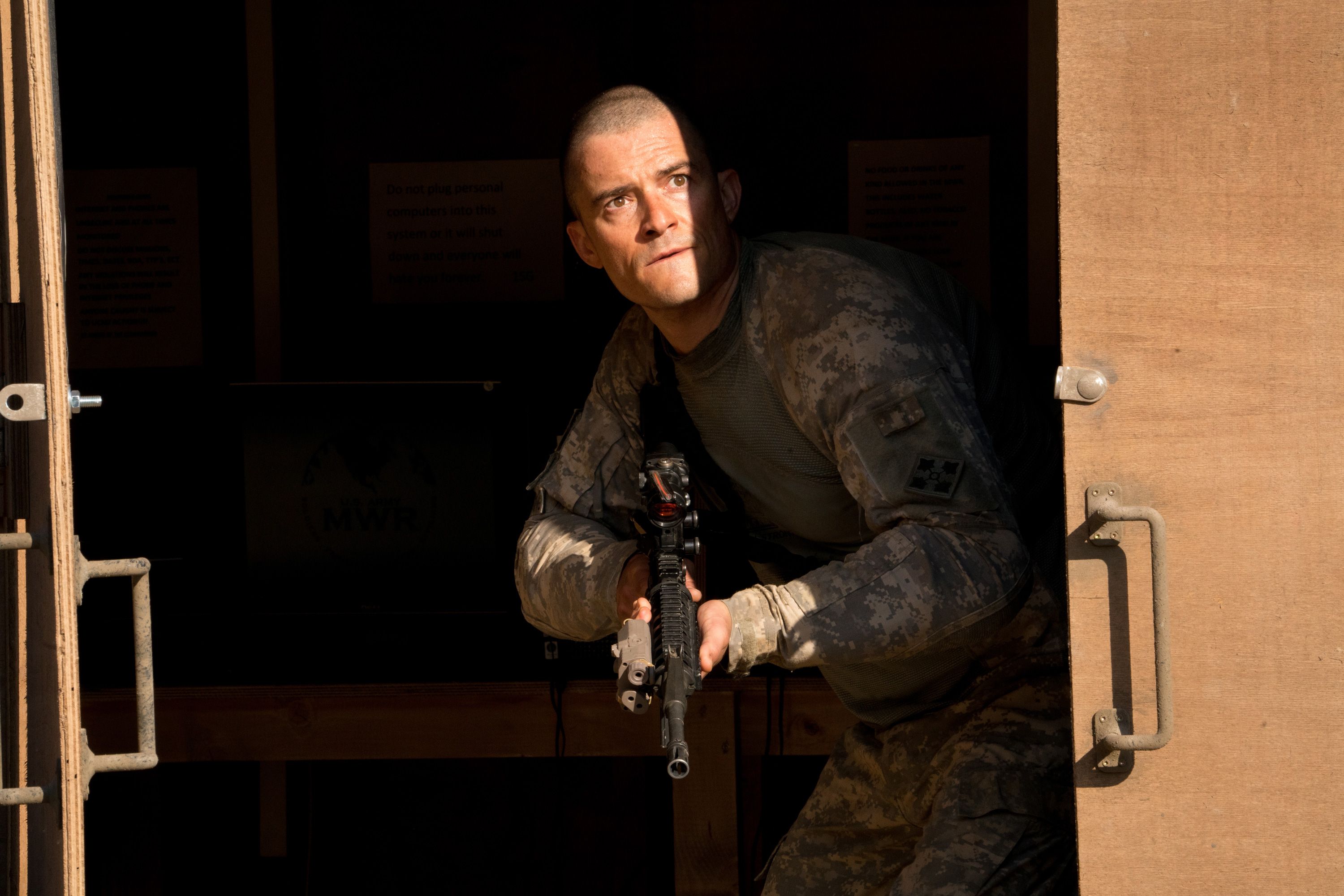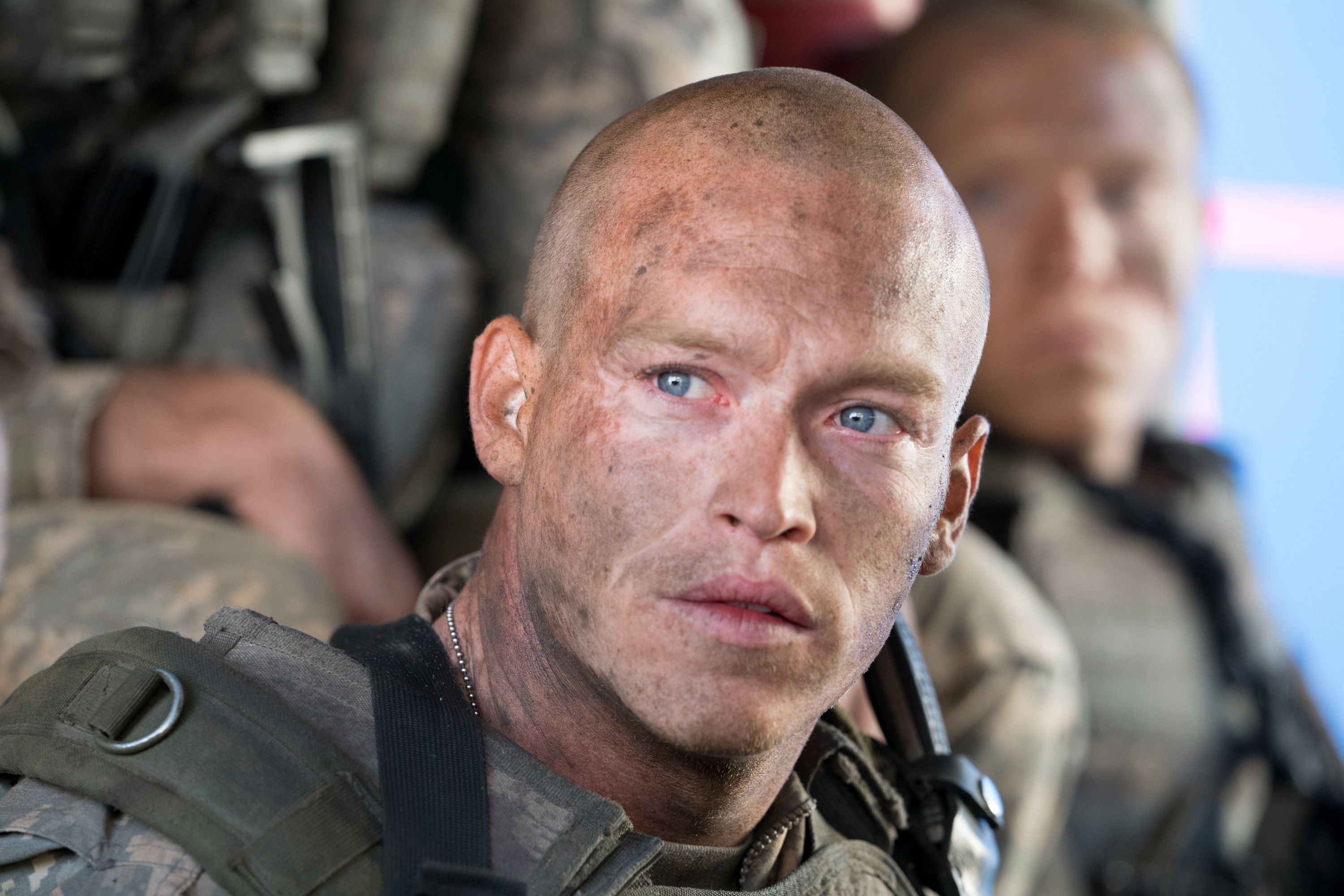Rod Lurie’s Afghanistan War drama The Outpost (based on a nonfiction book by CNN’s Jake Tapper) features a lot of theoretically helpful on-screen text, including the names of nearly every character as they’re introduced, but it’s tough to retain information about these various men when they’re all dressed the same and speak the same way and behave in the same manner. Perhaps it’s a testament to the movie’s military authenticity that its characters come across as one monolithic entity, but even after an hour of supposedly getting to know these people, it’s nearly impossible to tell them apart.
The first glimpse of many of the main characters comes as they’re traveling via helicopter to a remote outpost near the Afghan town of Kamesh, and it’s too dark to even distinguish their faces as their names flash on the screen. The base, later named Combat Outpost Keating, is one of several established by the U.S. military for counterinsurgency purposes, to engage with locals and counteract the influence of the Taliban. Located in a valley surrounded by mountains, COP Keating is in a strategically vulnerable position, and the military has already nearly abandoned it, with resources focused elsewhere and a plan to close the base down within several months.
In the meantime, though, the soldiers stationed there go about their duties, and the first half of the movie contrasts the mundane daily efforts with sudden bursts of terror, as hidden insurgents in the mountains beyond the base frequently open fire without warning. The movie is divided into chapters named after the base’s commanding officers, starting with First Lt. Benjamin Keating (Orlando Bloom, doing a terrible American accent), a compassionate leader who seems to be making genuine connections with the locals. Keating doesn’t last long, though, and subsequent leaders are less patient with the Afghans. They're more focused on military protocol and winding down operations.
The soldiers joke around and give each other a hard time, but they step up when it’s necessary, shifting into combat mode immediately when someone starts shooting at them from the surrounding hills. Maybe it was once surprising in a war movie when a good-natured conversation among soldiers was suddenly interrupted by violence, but it’s become so expected that it’s almost laughable every time Lurie and screenwriters Eric Johnson and Paul Tamasy use it here. If characters start joking around too casually, it’s pretty much a guarantee that one of them is about to get shot or blown up.
When they do, it’s hard to care, since almost none of the characters have anything resembling a distinct personality. The one soldier who sticks out slightly is Specialist Sgt. Ty Carter (Caleb Landry Jones), who’s considered an oddball because he doesn’t participate in the other soldiers’ “frat boy shit.” Eventually, Staff Sgt. Clint Romesha (Scott Eastwood) emerges as a leader, although he doesn’t do anything in the first half of the movie to indicate that he’ll be important (other than being played by one of the few recognizable actors).
Johnson and Tamasy previously worked on the Mark Wahlberg movies The Fighter and Patriots Day, so it's not surprising The Outpost resembles a lower-budget version of one of Wahlberg and director Peter Berg’s signature American Hero movies, with its calcified reverence for veterans and its glorification of combat sacrifice. Berg and Wahlberg themselves made a true-story Afghan War movie with 2013’s Lone Survivor, and while The Outpost is less bombastic, it’s also less distinctive. At least Wahlberg has enough screen presence to command the audience’s attention, which is more than can be said for anyone in The Outpost.
After all the throat-clearing of the first hour, the heart of the movie is the 40-minute battle sequence that starts around the halfway mark, depicting the real-life Battle of Kamdesh in October 2009, one of the deadliest confrontations during American operations in Afghanistan. When Taliban fighters take advantage of the base’s weak position to launch an all-out attack, the American forces are outnumbered and outmaneuvered, but they pull together and fight back, eventually driving off the Taliban despite suffering heavy casualties. Lurie shoots the battle sequence with numerous fluid long takes, often keeping the camera low to the ground, right alongside the soldiers as they dodge enemy fire. Although it sometimes too closely resembles a video game, the sequence effectively conveys the chaos and territory of being caught in the middle of a surprise attack.
The geography of the camp remains unclear, though, and the players themselves are still so ill-defined that most of the injured and killed might as well just be background extras. For all the time he spends on attempted character development, Lurie still fails to get across just how many soldiers are in the camp, and there are multiple moments during the battle when some entirely new group of soldiers suddenly shows up, ready to fight. The leader of the Latvian coalition force gets one line early in the movie and is never seen again, although presumably some Latvians fought there, too.
When Romesha rallies his fellow soldiers to fight off the invaders, he says stuff like “We’re taking this bitch back!,” and the movie has a fairly simplistic sense of rah-rah patriotism. There are a handful of moments that suggest a more complex and critical take on military operations, starting with the idea that the base itself was set up to be a death trap. The soldiers often sarcastically say “Thank you for your service” to each other, and there’s a sense of futility to their entire mission that could make for a more thoughtful, character-driven movie. But Lurie instead opts to emulate filmmakers like Berg and Michael Bay, whose 13 Hours: The Secret Soldiers of Benghazi took a similar action-oriented approach to a surprise attack on American forces. The result is just as empty as those civilian platitudes that the characters repeatedly mock.
Starring Scott Eastwood, Caleb Landry Jones, Milo Gibson, Jack Kesy, Jacob Scipio, Taylor John Smith and Orlando Bloom, The Outpost opens Friday in select theaters and on VOD.



